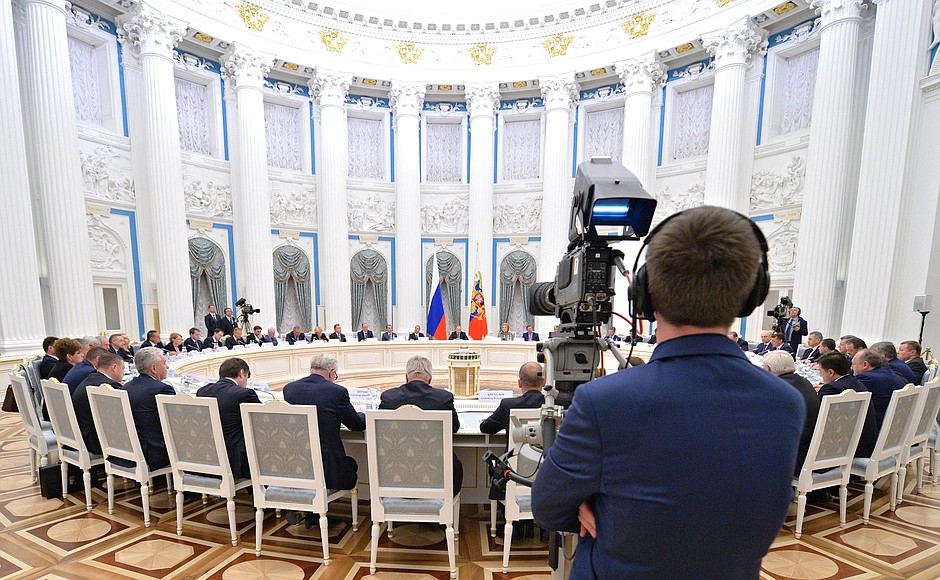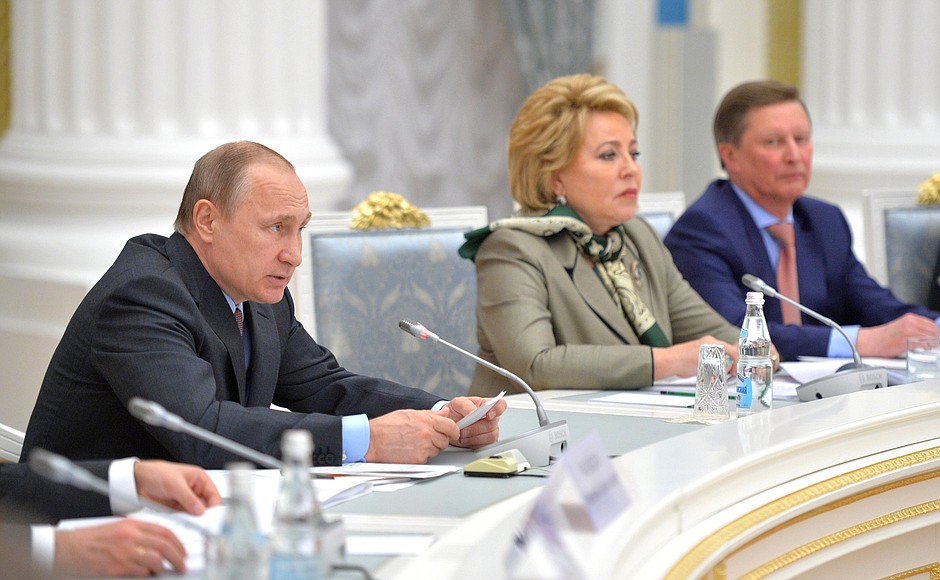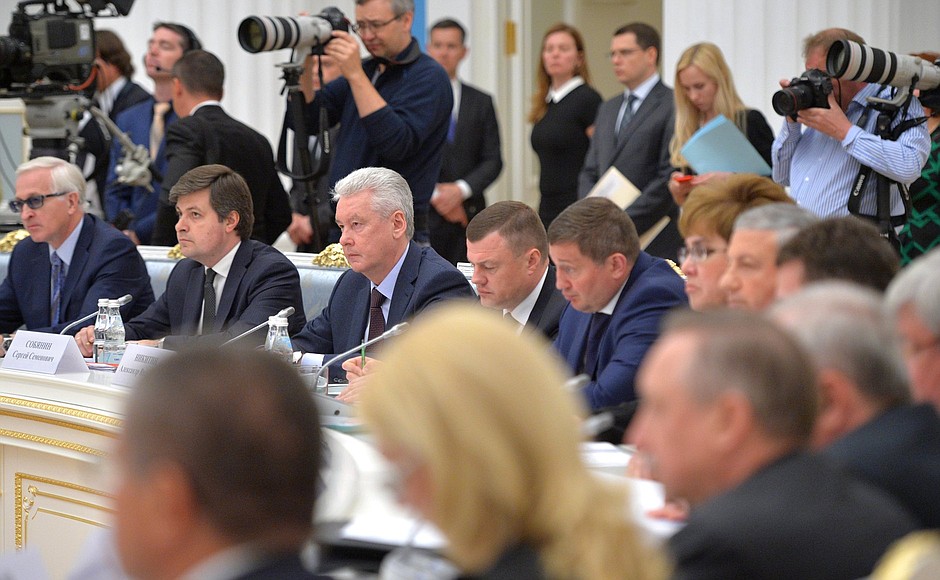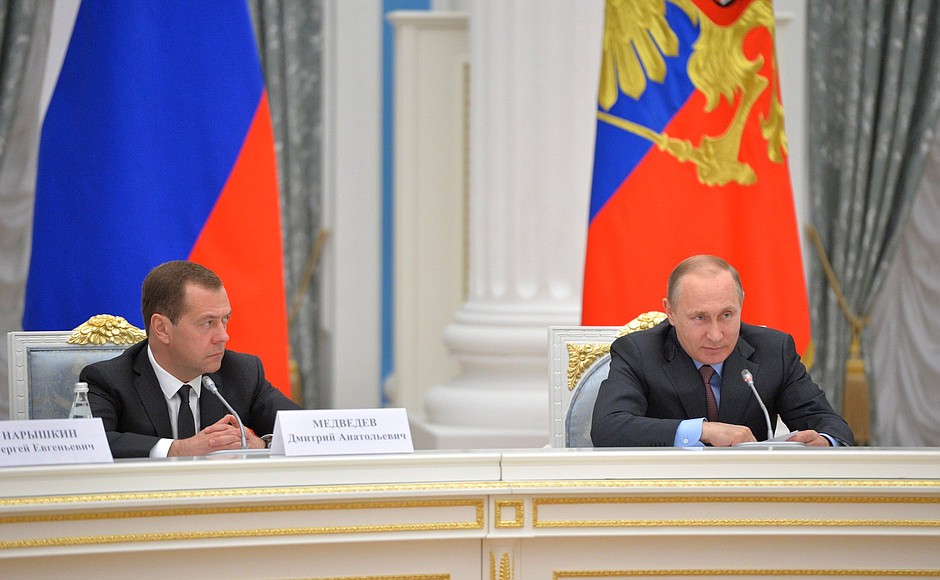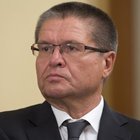The meeting discussed the state of progress in implementing the instructions set out in the presidential executive orders of May 2012. The agenda included, in particular, issues pertaining to staffing the healthcare system with qualified personnel, development of supplementary education for children, and raising the quality of public services, including in the housing and utilities sector.
The meeting was attended by the heads of ministries and agencies, the plenipotentiary presidential envoys to the federal districts, and a number of regional heads.
Healthcare Minister Veronika Skvortsova, Education and Science Minister Dmitry Livanov, Labour and Social Protection Minister Maxim Topilin, Construction, Housing and Utilities Minister Mikhail Men, and Economic Development Minister Alexei Ulyukayev all made reports at the meeting.
* * *
President of Russia Vladimir Putin: Good afternoon, colleagues,
Four years ago, in the May 2012 presidential executive orders, I set objectives for the economy, social sector, demography, science and education and other areas. We took upon ourselves great commitments before the public at that time and we must work now without trying to use current difficulties and outside limitations as an excuse.
Let me repeat now, as I already said last year in this same hall, if I recall correctly, that we must assess the results of our work not by the number of instructions deemed completed and the volume of reports written up. This, we know, we are all perfectly good at. But what we need is for people to really see tangible changes for the better.
People should see that it has become easier to start up their own business, for example, easier to get their child a place in a kindergarten, move into a new and more comfortable home, and obtain quality medical assistance. These are all basic things that constitute the measure of prosperity for millions of Russian families.
It is of fundamental importance that the objectives set in these executive orders should be carried out around the entire country. We must raise people’s quality of life in big cities, small towns, and in the countryside. We must pay particular attention to remote and hard-to-access places, including in Siberia and the Far East. We must make the extra effort here to develop healthcare, transport infrastructure, build new housing and modernise the housing and utilities sector.
I note that the Russian Popular Front’s activists are playing a big part in ensuring on-going monitoring of the situation on the ground. They identify where we have clear and evident problems, and where people are trying sometimes to put fictitious results on paper rather than doing real work.
This kind of public rather than bureaucratic monitoring of the executive orders’ implementation has proven its effectiveness and use and has become an example of genuine partnership between the state authorities and society in carrying out our national development strategy.
Colleagues, we have many big tasks before us today. We must make timely examinations of the executive orders’ implementation at meetings with the Government members, with regional governors, and at meetings of the State Council and its presidium.
We have monitored closely the results of the programme to resettle people out of dilapidated housing, and also road safety, where we have seen positive change. I will soon be discussing with my colleagues from the Government the question of raising public sector wages. Tomorrow at the State Council meeting we will take a detailed look at additional measures to build new housing and make it more affordable for people.
Today, working in this broad format with the heads of ministries and agencies, the Accounts Chamber, regional heads, and representatives from the Russian Popular Front all taking part, I propose that we examine the areas of work that have the greatest direct impact on our citizens’ quality of life.
First, we have established a network of multifunctional centres that work on the ‘one-window’ principle. We have succeeded in changing the decades-old system that saw people trailing from one office to the next and spending unjustified lengths of time in queues in an attempt to get the needed certificates or documents. The surveys show that people find the new methods of providing state and municipal services convenient.
A total 2,759 of these centres have been set up so far. There are still some outstanding problems to resolve however. I would like to hear from you today on the measures you are taking to shorten the waiting time in queues. We have even made some outlines of the standard waiting times, the average that we should work towards.
We also need to make online interaction between the state agencies and the multifunctional centres more efficient. This will go a long way towards ensuring quicker provision of services.
We have already noted that the number of places in pre-school facilities is close now to the target set in the May 2012 executive orders. This is certainly a big step forward in resolving the tasks that will improve people’s quality of life.
A lot of progress has been made in developing supplementary education for children. The number of children now studying in music and sports schools and attending various groups and extracurricular activities is growing.
We have succeeded in preserving many of the old children’s and youth activity centres. This is not the case everywhere, but many of them continue to function today. At the same time, we are also developing new formats, children’s technoparks such as Quantorium, for example, where children can learn about robotics and other fields that will be in demand very soon on the labour market. Children find this interesting. It sets their eyes alight. I visited this particular centre and it really is an excellent place.
Starting next year, financing for supplementary education institutions, public and private, will be a separate item in regional budgets. I remind you that by 2020, at least 70 percent of children should study in music and sports schools and attend various groups and extracurricular activities. I want to hear from you today on where we stand now with regard to this target and what we need to do to reach it.
Third, we have made substantial progress in developing the healthcare system and in a number of areas have already reached the targets we set for 2018.
The objective figures show that we have lowered infant mortality and deaths in childbirth. These are objective statistics that show that we have reached a historic minimum in this area and a historic maximum in life expectancy. Mortality caused by cardiovascular and other diseases has dropped and people now have much greater access to high-technology operations.
At the same though, people often make justified complaints about the healthcare system. The most important thing for people is to have professional and competent medical help.
To be honest, there is often a shortage of qualified doctors, especially specialist doctors and primary healthcare workers, in rural areas. This problem is particularly acute in small settlements and remote areas. I want to hear today about the steps underway to make sure the healthcare system has the professionals it needs. This task is one of the priorities today.
Fourth, big transformations are underway in the housing and utilities sector. We have introduced a licensing procedure for the managing companies. To keep prices down in this sector we have set maximum price growth thresholds for all regions. We have developed a state support mechanism for projects to modernise utilities infrastructure in small towns. Let me stress that all of these solutions will produce effective results only when we ensure that this sector is open and transparent for society and the public.
The instruction was given to establish the state housing and utilities sector information system so that everyone can check personally exactly what they are paying for, see the managing company’s own figures, and make complaints in real time if need be. We need to discuss today just when everyone will be able to make full use of this system and its possibilities.
Fifth, the law on independent evaluation of service provision in the social sector has entered into force. People now have the chance to make known their opinion on the work of local medical centres, hospitals, schools, kindergartens and libraries. These public assessments will be used to make a rating of education, healthcare, cultural and social service provision centres. Personnel and management decisions should be made taking into account the results of these evaluations.
Let me stress that openness and taking into account public opinion should be incentives for transformation in the social sector. It is very important that organisations in this sector listen to what people are saying, respond to their demands and interests, and raise the quality of work. In this context, I also ask the Russian Popular Front to monitor implementation of this system for independent assessment of the social sector’s work.
Let’s start work.
<…>
